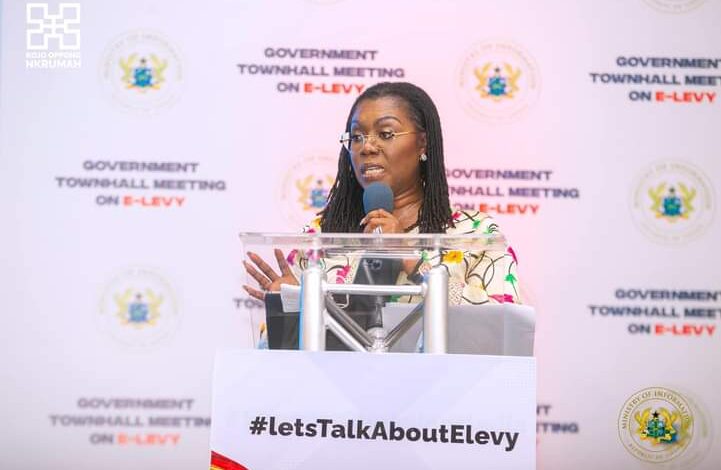Communications Minister, Ursula Owusu-Ekuful, has said the proposed 1.75% levy on electronic transactions was long overdue and has urged public support for the tax.
Delivering a speech on the controversial tax at one of the many scheduled government-sponsored townhall meetings at Koforidua on Thursday, the Ablekuma West MP stated that the e-levy was quite low when compared to what other countries were charging citizens as digital taxes – citing the United Kingdom as an example one of the countries where E-levy was high.
“In 2008, the government of President Kufuor introduced the Communications Service Tax in August of that year, and it became another source of income for national development. That tax was introduced at a rate of 6%, which was later increased to 9%. E-levy is being introduced at the lowest rate for any tax in Ghana, comparatively at 1.75%. Less than 2%. In other countries, digital taxes are being introduced at the rate of up to 10% and they’re paying – that’s the UK – and we go there and seek loans from them to finance our development. When we are not paying the requisite taxes that we should,” Mr Owusu-Ekuful said.
She appealed to Ghanaians to support the electronic tax to enable the government to mobilise enough revenue for development.
She was also hopeful that if implemented, the tax will enable the government issues such as unemployment and mounting national debt.
READ ALSO: E-levy will provide more jobs – Akufo-Addo
She traced the history of the implementation of a similar tax in her bid to allay the worries of a teeming number of Ghanaians opposed to the tax:
“When the Communication Service Tax (CST) was introduced, it faced similar opposition as we are seeing currently. And the current speaker dubbed it as ‘talk tax’, as the NDC and the industry-led by the GSMA data claimed that it would damage the growth of the telecommunications industry as consumers will change their mobile communications habits. This did not happen. They were unfounded fears.
"Incidentally, at the time, I was the spokesperson for the mobile telecommunications network operators, and I remember vehemently opposing the Communication Service Data based on data from the GSMA.
"Several years on, we realised that those dangers were unfounded. It never happened, the industry has grown exponentially since 2008, and all of us find telecommunications and digital infrastructure applications and services as indispensable to everything that we seek to do.
"The same speculations and complaints are being made about the e-levy. That consumers will stop using electronic transactions because of the imposition of this levy.
"I dare say that based on our experience with the CST, and lessons from other African countries, we are confident that the E-levy will not bring about any negative changes in consumer behaviour, as electronic transactions afford us the convenience, the safety, the security, that we currently enjoy,” she stated.
There is widespread pushback against the levy that some experts say was unfair because it seeks to tax incomes in electronic wallets.





